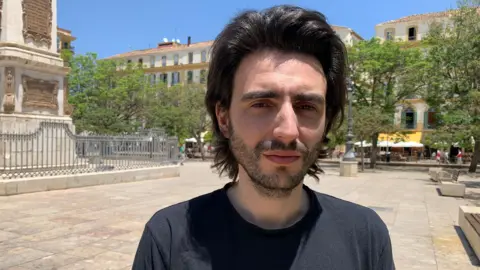 Guy Hedgecoe
Guy HedgecoeKike España gazes across Málaga’s Plaza de la Merced.
It’s late morning and it’s still a peaceful spot at this time of day – jacaranda trees fill the square, an obelisk monument sits at its centre and on the far side is the house where Pablo Picasso was born.
But it’s the city’s tourists, many of whom are already gathering in the host of nearby cafés, who concern Kike.
“The situation is so saturated that Málaga has really reached a turning point at which people feel that the city is collapsing,” he says.
“It’s the same feeling you have when you enter a theme park,” he adds. “There is a stream of people that are consuming the city and not really inhabiting it.”
Kike is an urban planner and a local activist with the Málaga Tenants’ Union, which has been campaigning for a change in how the southern Spanish city manages tourism.
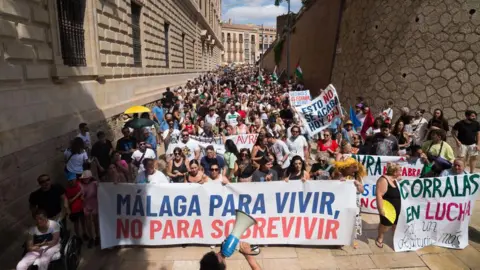 Getty Images
Getty ImagesThe organisation led a protest in late June in which thousands of local people took to the streets to voice their concern at the negative impact that tourism is having on their city, including pushing up housing costs, gentrification and crowds.
And it’s not just Málaga. Spaniards have been protesting throughout the summer for the same reasons in other major tourist destinations, including Barcelona, Alicante and the Canary and Balearic Islands.
In April, a group of activists on Tenerife staged a three-week hunger strike against the building of new tourist megaprojects. In Barcelona, demonstrators fired at foreign visitors with water pistols and among the slogans daubed on their banners were: “Tourism kills the city” and “Tourists go home.”
Spain first established itself as a tourist hub more than half a century ago, as northern Europeans started to flock to its coastline and islands.
Today, the industry represents about 13% of Spanish GDP and, having bounced back from the Covid-19 pandemic, it is surpassing records in terms of both revenue and arrivals.
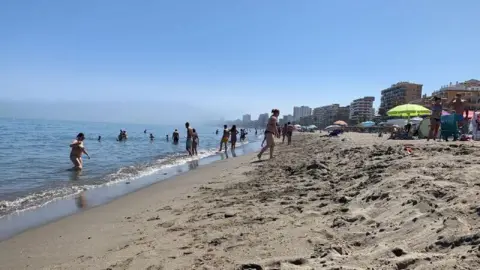 Guy Hedgecoe
Guy HedgecoeIn 2023, the country received 85 million foreign visitors and more than 90 million are expected this year, putting it close behind France, the world’s most popular tourist destination.
José Luis Zoreda, president of the Exceltur, a tourism industry association, prefers to talk about the amount of revenue the industry generates – €200bn (£171bn) in direct and indirect activity this year, he estimates – rather than the number of visitors.
He also highlights how tourism has ensured that the Spanish economy has outperformed most of its European neighbours in the wake of Covid-19.
“We have been responsible in the last few years for the most important percentage of growth of our economy,” he says. “In 2023, we were responsible for 80% of the whole GDP growth of Spain.”
So the sheer size of the tourism sector and its strong growth have driven the overall expansion of the Spanish economy.
But there is a growing belief that the cost of such success is too high and the wave of recent protests has created the sense of a tipping point. Many Spaniards are now convinced that the towns and cities they inhabit are catering more for visitors than for residents.
“Tourism was perceived as a positive economic activity that is a huge part of our GDP, but the numbers have become so huge in terms of international arrivals that we are now seeing the negative impacts, especially in cities,” says Paco Femenia-Serra, lecturer in tourism and geography at Madrid’s Complutense University.
“Tourism is competing for space and the number of people out on the streets is unbearable for many residents.”
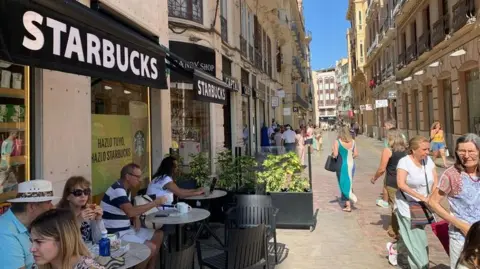 Guy Hedgecoe
Guy HedgecoeBesides making these places less pleasant, locals say tourism has also pushed many smaller businesses out of the centre of cities. In their place have come franchise restaurants, bars and shops – and prices have risen.
But the most-cited problem is that of housing.
Spain’s biggest tourist destinations have large numbers of short-term rental properties aimed at tourists.
A recent study by El País newspaper found that several areas of Málaga had the highest proportion of Airbnb properties in Spain. A quarter of all apartments in the area around the Plaza de la Merced are dedicated to tourist rental.
Owners of apartments are able to charge more for short-term rentals than they would charge longer-term tenants and this has the effect of pushing up prices across the board. Locals say it is difficult to find an apartment for less than €1,200-1,300 per month in the centre of Málaga. With the average salary in the surrounding Andalusia region at just €1,600 per month, they are being priced out of their city.
“If the people of Málaga don’t have somewhere to live, who will provide services for the tourists?” asked Isabel Rodríguez, housing minister for Spain’s governing Socialist Workers’ Party (PSOE).
Speaking at a housing forum in the city in July, she continued: “Where will the waiters who serve us a glass of wine and a plate of sardines live?”
As Ms Rodríguez’s comments suggest, Spain’s political class is now starting to grapple with the tourism conundrum.
Catalonia and the Balearic Islands have already introduced a “tourist tax”, charging a sliding sum of up to €4 per person per day, depending on the type of accommodation used.
Palma de Mallorca has sought to limit numbers of arrivals by sea, with no more than three cruise liners allowed to dock at the city per day, only one of them carrying more than 5,000 passengers.
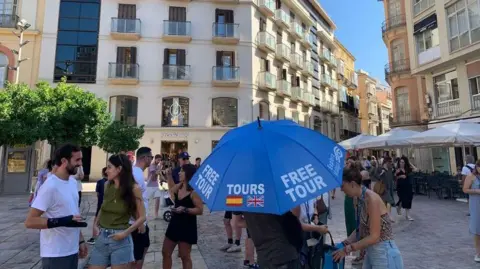 Guy Hedgecoe
Guy HedgecoeMeasures are also being taken to tackle the tourist accommodation issue. This year, the regional government in Andalusia has handed town and city halls the power to introduce their own controls on short-term rentals.
In the north-east, Barcelona has already announced its intention to revoke all of the 10,000 or so tourist accommodation licences currently in circulation in 2028.
Mr Femenia-Serra describes the reining in of Spanish tourism as “a very tricky problem” given the economic weight of the industry but he believes restrictions are needed.
“If we want to talk about sustainable tourism or a lower number of tourists we should discuss limits on activity and higher restrictions and more regulation of the sector, which until now has been kind of free to act,” he says. He suggests introducing limits on the number of flights to certain destinations as a possible measure.
In Málaga, Kike España wants to see caps on rental prices and efforts to provide more housing for locals as immediate measures to counter the tourism crisis.
While he insists that he and his fellow activists are not opposed to tourism, just the way it is being managed in Spain, he says he also hopes the protests will continue.
“We are against city models that only focus on tourism,” he says. “We cannot lose all the energy and complexity and heterogeneity of our cities.”
